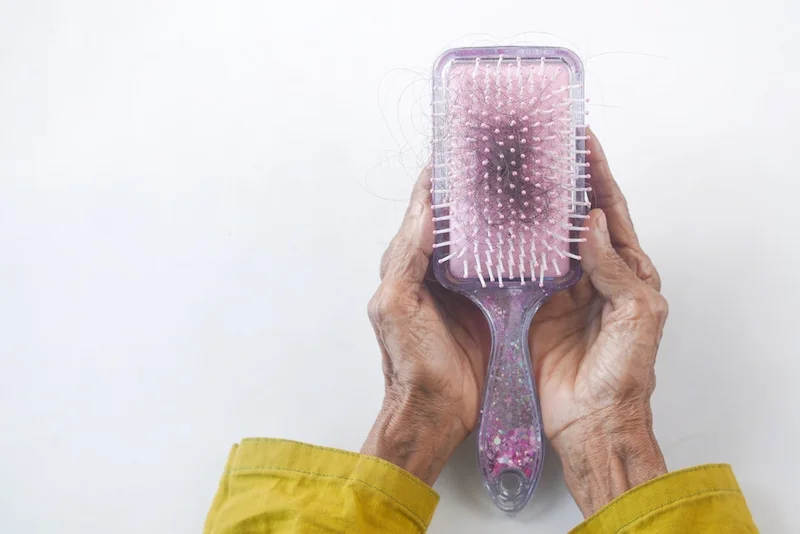Table of Contents
Hair thinning can be a distressing experience for individuals of all ages and genders. Various factors contribute to this issue, many of which stem from our everyday lifestyle choices. Understanding these can empower you to make alterations that prevent further hair loss or even promote growth. Not everything is hereditary or natural, and numerous external influences can significantly affect your hair’s health. You can proactively combat the problem by identifying what leads to hair thinning. Explore these lifestyle factors in detail.
Hair Care Practices
The methods used for hair care can significantly influence hair condition. Harsh chemical treatments, frequent heat styling, or over-washing can lead to broken strands and thinning. It’s advisable to limit styling products that contain sulfate or alcohol, as they can dry out and weaken hair. Instead, opting for gentle, nourishing products can promote better hair health.
Simplifying your hair care routine while incorporating moisture-rich treatments can contribute positively to hair vitality. This includes regular deep-conditioning sessions and scalp massages to stimulate circulation. You can also consider clinically proven topical and effective treatments online for hair thinning. Often, topical treatments stimulate hair growth by creating an optimal environment for hair follicles to grow thicker and faster. Overall, these adjustments can significantly improve your hair’s strength over time.
Diet and Nutrition
A critical factor affecting hair health is diet. A well-balanced diet of vitamins and minerals is essential for maintaining hair strength and vitality. Deficiencies in nutrients like iron, Vitamin D, and biotin can lead to hair thinning. Incorporating foods that are high in these nutrients can significantly improve follicle health. Additionally, researching clinically proven hair loss treatments online has become more accessible.
While lifestyle changes may take time, targeted treatments can complement dietary improvements, helping to restore hair thicker and healthier. Consuming processed foods high in sugars and unhealthy fats can negatively affect hair health. These foods might cause inflammation and lead to scalp issues, contributing to hair loss. Therefore, shifting focus toward whole, nutrient-rich foods is paramount for optimal hair health.
Stress and Mental Health
Stress is another significant contributor to hair thinning, often manifesting in conditions like telogen effluvium. When experiencing high stress, the hair growth cycle can be disrupted, pushing hair follicles into a shedding phase. Therefore, recognizing stress triggers and managing them effectively can be crucial for hair health. Activities such as yoga, meditation, and deep-breathing exercises can aid in reducing stress levels.
Chronic stress may lead to additional health complications that can further exacerbate hair loss, showcasing the interconnectedness of mental and physical health. It’s vital to incorporate self-care routines that nourish your emotional health and indirectly benefit your appearance. By engaging in regular exercise, you stimulate circulation, which can enhance nutrient delivery to hair follicles and improve hair growth. By prioritizing a balanced approach to mental health, you can lay the groundwork for stronger and healthier hair.
Sleep Quality
Sleep is another often overlooked factor that significantly impacts hair health. During deep sleep, the body engages in repair and regeneration processes crucial for hair growth. Chronic sleep deprivation can disrupt these essential processes, weakening follicles and increasing shedding. Establishing a regular sleep schedule can help improve the quality of sleep and enhance hair vitality. Aim for sufficient hours of uninterrupted sleep per night to allow your body adequate time to recover. A tranquil sleeping environment can further enhance restfulness and positively impact hair health.
Environmental Factors
The environment you live in can drastically affect your hair quality. Pollution, excessive sun exposure, and harsh climate conditions can contribute to hair damage and thinning. Protecting your hair from environmental stressors should be prioritized, especially if you live in a densely polluted area. Wearing hats or using UV protection products can help minimize outdoor damage.
The water quality you use for washing your hair can also play a significant role, as hard water may leave mineral deposits that weaken hair. Investing in a shower filter may be a worthwhile solution to combat such issues. Regular trims can also contribute positively by removing split ends and keeping hair aesthetically pleasing and more substantial. By using the proper protective measures adapted to the environmental conditions, you can significantly enhance the condition and appearance of your hair.
Hormonal Changes

Hormones significantly impact hair growth and loss. Significant life stages can trigger hormonal changes that lead to hair thinning. Understanding your body’s hormonal balance is key to recognizing the causes behind hair loss. Consulting with healthcare professionals can provide insights into managing hormonal fluctuations effectively. Regular monitoring and testing can help identify if hormonal changes are influencing hair health.
Sometimes, medications or supplements can alleviate these effects, promoting better hair growth. Furthermore, lifestyle changes such as dietary modifications or exercise regimes tailored to balance hormones can be preventative measures against hair thinning. Addressing hormonal issues positively impacts hair and improves overall well-being.
Hair thinning can arise from various lifestyle choices encompassing diet, stress, hair care practices, sleep quality, environmental factors, and hormonal changes. By approaching these areas thoughtfully, it’s possible to adopt strategies that enhance hair health and appearance. Paying attention to the nutritional quality of your diet and managing stress effectively can lay a solid foundation for vibrant hair. Similarly, refining hair care routines and ensuring quality sleep can contribute to your overall hair vitality. A comprehensive understanding of these elements allows you to take proactive steps toward minimizing hair thinning.
Want to explore something different? How Criminal Defense Lawyers Use Investigators to Build a Case

